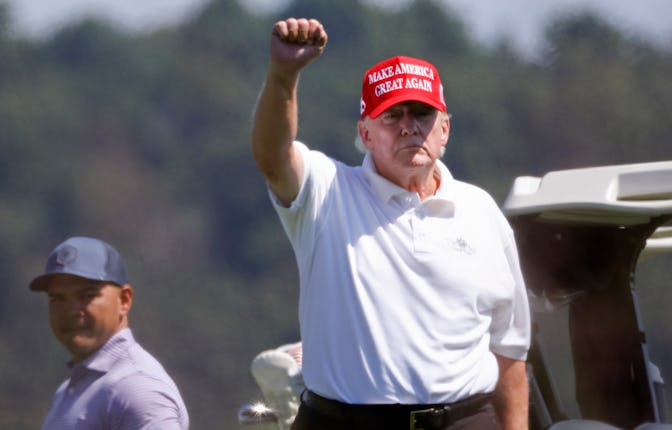Trump thinks the country would have “big problems” if he gets indicted
Nice country you got here. Would be a real shame if something were to happen to it…

When the going gets tough, the tough get going. And while Donald Trump is, himself, not a particularly tough guy (although, boy does he wish he was) he has looked around at the cascading series of serious legal threats in which he now finds himself immeshed, and decided that now is the time to do ... well, something. In this case, that “something” means “give a fluffy interview with a notoriously friendly conservative broadcaster,” which is what Trump did on Thursday, calling in to longtime right wing media figure Hugh Hewitt’s syndicated radio show to rant and rave about how gosh-darned unfair life has been for him, and also, it seemed, imply the threat of a little stochastic violence.
After kicking things off with a characteristic boast about the size of his recent and upcoming political rallies (“there will be no lack of crowd on Saturday night, I can tell you that”) Trump pivoted to his stock litany of defensive aggrandizements, telling Hewett that he’d absolutely declassified all the documents the FBI had confiscated in their recent search of his Mar-a-Lago estate. He also dismissed the growing investigation into his allies’ effort to subvert the 2020 presidential election results with “alternative slates” of state electors, which he claimed was a perfectly normal, not at all controversial practice.
Now, putting aside the fact that Trump’s own attorneys have very conspicuously not claimed Trump declassified all the Mar-a-Lago documents, as well as the fact that Trump’s alternate electors scheme was, y’know, deeply not legal, the real meat of the interview came later with what seemed like a not-so-veiled threat of overt violence should any of the many investigations into Trump’s many forms of alleged criminality actually lead to an indictment.
Insisting that he “would have no prohibition against running” for office a third time, should he actually be indicted, Trump told Hewitt that if an indictment were to come, “I think you’d have problems in this country the likes of which perhaps we’ve never seen before. I don’t think the people of the United States would stand for it.”
“Big problems,” he emphasized a moment later, despite insisting that he wasn’t calling for violence, but merely “saying what my opinion is.”
As former Trump consigliere Michael Cohen made emphatically clear during his congressional testimony in 2019, this is a classic example of how Trump operates: not with direct assignments and step-by-step instructions, but with vague proclamations of expected outcomes and insinuations for his various underlings to act upon on their own volition. It is, in fact, the exact same sort of nebulous incitement Trump has already seen leads to riotous violence like that which occurred on January 6, 2020. With that in mind, it feels likely that in this instance Trump is issuing what, for him, amounts to a call to arms aimed at his supporters, and a threat to anyone else who might act against him.
All this comes as Trump himself has ramped up his political activity ahead of the coming midterm races, while the Justice Department, Congress, and various state and local investigators resume their investigations against him and his allies. It is into this fraught, fragile environment that Trump has inserted his latest apparent threat to violence. Should (or, perhaps more likely, “when”) his followers act accordingly, I suspect we’ll someday look back to this interview in particular as a crucial stepping stone to that point.